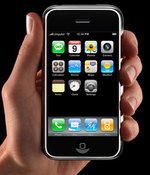Instead of calling it an iPhone, how about we call it the MacGuffin?
Hitchcock explained the MacGuffin this way. A man enters a train car and puts down his bag. Another man asks what’s in it. "A MacGuffin," the first man says. The MacGuffin is merely a plot device, a way to move the story forward. The Maltese Falcon was a MacGuffin, "the stuff that dreams are made of."
In this case the dream is of a new, site-defined and carrier-controlled Internet. This has been the carriers’ demand in the U.S. since they first introduced "Internet access" to mobile phones. Consumers have resisted this, U.S. cellular growth has plainly lagged the rest of the world, and the carriers have mainly blamed the phones.
Now that excuse is gone.
The Apple MacGuffin (as Cisco would have us call it) is, like all such phones, completely carrier-controlled. In this case the carrier is Cingular, soon to become AT&T. Had such an agreement not been necessary, Apple would have introduced the phone a year ago (and in fact planned to).
On the MacGuffin your Internet use will be completely defined by
Cingular, which is signing up sites to provide basic service. It’s not
like a PC. There will be no such thing as network neutrality with the
iPhone (sorry, uh MacGuffin). A site that does not have a specific service agreement with
Cingular won’t reach your iPhone, or will have its service severely
degraded.
That’s the threat of this phone, and of cellular generally. If
Americans switch their Internet use to wireless devices, to cellular
networks, they lose network neutrality no matter what happens
elsewhere. AT&T said in acquiring BellSouth that it saw its
opportunities laying in wireless and advertising — how much more
explicit do they have to be?
Yet you haven’t read that, until now. Everybody’s got their eyes on the MacGuffin.
You should be watching the director instead.













Your general point is well made, but you are a bit shaky on the details. The web will work fine on the iPhone. If it doesn’t, it will be because of Apple not Cingular. How do I know? Because the web works fine on Windows Mobile. What will not work fine is downloadable content. You will be locked into using iTunes (and Cingular will get a cut). It’s not that they will block you from downloading other stuff, they’ll just keep it from working on the phone. In the end this has just as much to do with Apple as it does with Cingular. Their business models are not dissimilar. The difference is that Apple has valid competitors who are willing to offer something different, while Cingular does not.
Your general point is well made, but you are a bit shaky on the details. The web will work fine on the iPhone. If it doesn’t, it will be because of Apple not Cingular. How do I know? Because the web works fine on Windows Mobile. What will not work fine is downloadable content. You will be locked into using iTunes (and Cingular will get a cut). It’s not that they will block you from downloading other stuff, they’ll just keep it from working on the phone. In the end this has just as much to do with Apple as it does with Cingular. Their business models are not dissimilar. The difference is that Apple has valid competitors who are willing to offer something different, while Cingular does not.